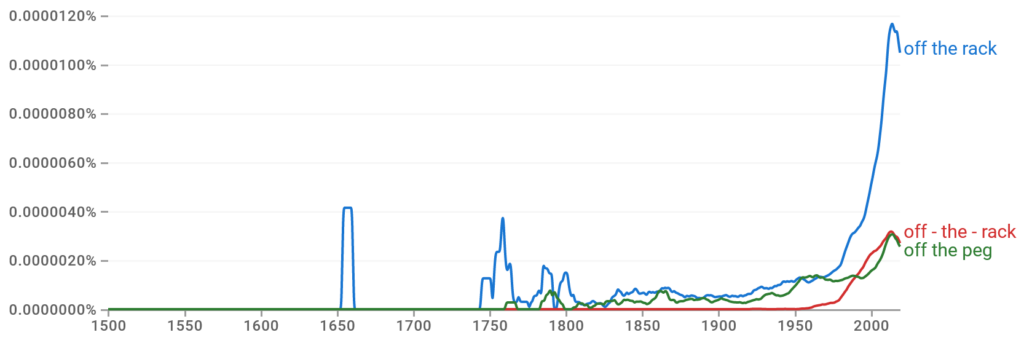Off the rack refers to clothing items that are ready-made and available for immediate purchase, typically in standard sizes, as opposed to custom-made or tailored garments.
Idioms such as off the rack are expressions whose meanings aren’t directly derived from the words they contain. Instead, they have a figurative sense. In the English language, idioms enrich communication by adding color, depth, and cultural context. They allow speakers to convey complex ideas or emotions succinctly and often with a touch of humor or local flavor.
This article delves into the idiom’s deeper meaning, uncovers its origin, and discusses its proper usage in different contexts. It also provides tips for effectively using the idiom, variations, sentence examples, and related terms and phrases.
So keep reading to learn more about the idiom off the rack, and you can test your knowledge of the idiom with a short quiz at the end.

What Does the Idiom Off the Rack Mean?
Off-the-rack clothes are pre-made and ready for immediate purchase in standard sizes, differing from custom-made or tailored garments. This expression is commonly used in the fashion industry context to describe mass-produced clothing that is not customized for a specific individual but rather designed to fit a general range of sizes.
Cambridge Dictionary states that “off-the-rack clothes are made and bought in standard sizes and not made especially to fit a particular person.”
The expression can also be used to infer something isn’t good enough or of poor quality or to generalize something mass-produced. It can indicate anything considered standard, generic, or lacking uniqueness.
Is It Off the Rack or Off the Peg?
Off the rack and off the peg mean the same thing. Off the rack is the American expression, and off the peg is more popular in British English. Off the peg is a slightly older expression and influenced the Americanized version.
Is Off the Rack Hyphenated?
Off the rack is typically hyphenated when used as an adjective before a noun. For example, “She bought an off-the-rack dress for the party.” However, the term is not hyphenated when not used before a noun. For example, “She found a dress off the rack.”
Variations of the Idiom
A few variations of the idiom off the rack exist due to regional differences, including:
- Off the peg (British)
- Off the hook (Australian)
- Off-the-rack (Adjective)
- Off-the-peg (Adjective)
How Is Off the Rack Commonly Used in Context?
The idiom off the rack plays a significant role in the fashion landscape, distinguishing ready-made clothing from customized or tailored options. In the sections below, explore the diverse applications of this phrase in different contexts, discover real-world examples illustrating its usage, and gain practical tips for effectively incorporating it into your language.
What Are the Different Ways to Use the Idiom Off the Rack?
The phrase is primarily associated with clothing but can be applied metaphorically to describe other standardized or generic situations.
- Describing clothing: Octavia bought a beautiful off-the-rack dress for the wedding.
- Shopping experience: I prefer shopping off the rack because it’s convenient and saves time.
- Quality or fit: The suit looked nice, but it was just an off-the-rack piece, so the fit wasn’t perfect.
- Comparing customization: While off-the-rack dresses are more affordable, a tailored gown provides a perfect fit.
- Figurative use: His speech sounded like an off-the-rack presentation, lacking originality.
Where Can You Find Examples of the Idiom Off the Rack?
From the vibrant world of fashion to consumer reviews and personalized tailoring services, the term off the rack finds application in various domains. Explore these contexts to witness how this phrase is commonly used:
- Clothing stores
- Fashion websites and online retailers
- Fashion magazines and blogs
- Fashion shows and runways
- Tailoring services
- Customer reviews
Here are a few examples of the idiom’s use quoted by some online publications:
While that’s good news for manufacturers of informal wear, from Bermuda shorts to jeans and T-shirts you buy off the rack, local menswear tailors will not be pleased to hear it. (The Business Times)
Back then, we embroidered flowers on our off-the-rack jeans, let our hair grow long and wild, sewed fringe onto our denim jackets — anything to distinguish ourselves, make us stand out from the pack. (Philadelphia Magazine)
What Are Some Tips for Using the Idiom Off the Rack Effectively?
Here are some tips for using the idiom off the rack effectively in your material:
- Context is key: Use the idiom in sentences where it makes sense to describe ready-made, non-customized items, particularly in the context of clothing or fashion.
- Be clear and concise: Use the idiom in a straightforward manner to convey the meaning of readily available and mass-produced items.
- Use it as a descriptive phrase: Incorporate off the rack into your sentence to describe clothing, shopping experiences, quality, fit, or comparisons between ready-made and custom-made options.
- Consider your audience: Ensure that your use of the idiom is appropriate for your intended audience and that they are familiar with the expression.
- Use it figuratively if appropriate: While off the rack is usually with clothing, you can use it metaphorically to describe other generic situations, but make sure the context supports the figurative usage.
What Is the Origin of the Idiom Off the Rack?

The idiomatic use of off the rack is not far removed from its literal inception. Ready-made clothing debuted in England in the late 19th century and was very popular by the turn of the century in both the UK and America. The clothing wasn’t considered a high-quality option, but it was functional and affordable.
These off-the-peg options were named as such since that is how the clothing was displayed—on a wall peg. Racks are just another name for a peg, originating from the 13th century.
Prior to this, mass-manufactured clothing was more or less reserved for slaves and servants. Once it became available to the public, it became more popular, and the idea quickly spread.
How Did the Idiom Evolve Over Time?
The idiom off the rack has undergone an interesting evolution. In its original context, it was often used pejoratively, noting the inferior quality of ready-made clothing items as compared to custom-tailored pieces. It essentially meant purchasing something standard without the personal touch or bespoke tailoring.
As the fashion industry advanced and quality improved, off the rack began shedding its negative connotations. Today, it still refers to ready-made, mass-produced clothing but no longer implies a lack of quality.
The phrase has also broadened beyond fashion, metaphorically applying to anything standard or generic. For instance, off-the-rack solutions or ideas refer to pre-made, non-customized options. Thus, while the idiom retained its core meaning, its application and associated perceptions have evolved with changing times and industry advancements.
What Are Some Related Terms to Off the Rack?
To further support your use of the idiom, consider alternating its use with synonyms and other related terms to provide the proper context in speech and writing.

Synonyms
- Ready-to-wear
- Off-the-shelf
- Pre-made
- Mass-produced
- Standard-sized
- Non-customized
Antonyms
Here are some antonyms that highlight the idea of clothing items specially made or tailored to individual measurements and preferences:
- Custom-made
- Tailor-made
- Bespoke
- Made-to-order
- Custom-tailored
- Handcrafted
- One-of-a-kind
- Personalized
Off the Rack (Peg): Test Your Knowledge!
Choose the correct answer.
What Have We Learned about the Idiom Off the Rack?
The idiom off the rack, rooted in the realm of fashion, signifies ready-made, standard items available for immediate usage. Its versatility expands beyond apparel, metaphorically denoting any generic or pre-made solution. Through its historical origins and contextual nuances, this idiom brings richness to English language communication, providing an interesting blend of cultural history and evolving linguistic usage.
Armed with this deeper understanding of the idiom off the rack, you’re better equipped to appreciate and utilize this colorful expression in varied contexts. Don’t forget to test your newly acquired knowledge with our quiz!
